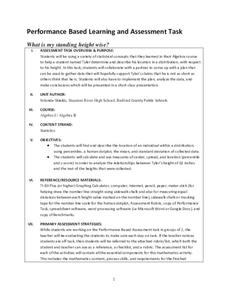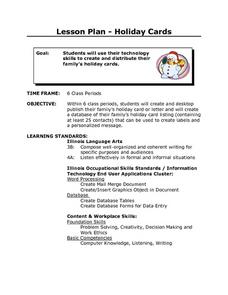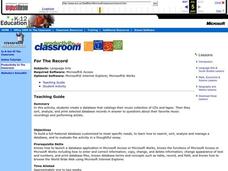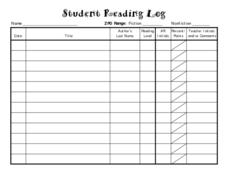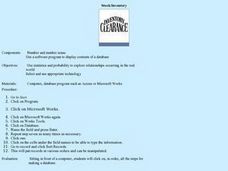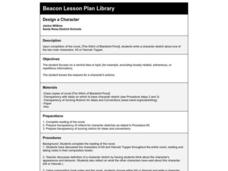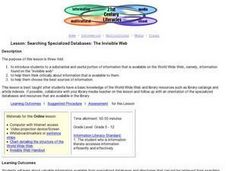The New York Times
Teaching the Vietnam War with Primary Sources from the New York Times
Use the New York Times database of primary sources to teach a unit on the Vietnam War. The resource consists of a variety of primary sources as well as a lesson plan showcasing how to teach a instructional activity using them. Pupils...
Radford University
What is My Standing Height Wise?
Given a scenario in which a class member wants to prove his height is not an outlier, pairs devise a plan and gather evidence to help support his claim. The small groups implement their plans and create graphical displays of their data...
School Journalism
Investigative and Data Journalism – Day One
A free press, free to investigate and report on responsibly, compelling stories, is essential to a democracy. A 10-slide presentation details where to get ideas, how to go about an investigation, gather data, and assure the accuracy of...
Curated OER
Famous People
Learners create a database with information about famous people. They develop a custom word-processing template. They practice merging fields into their template.
Curated OER
Holiday Cards
Students review basic computer skills needed to create a holiday card along with a database of at least twenty five contacts. They create their family greeting card including graphics, correct spelling an grammar. Using their database...
Curated OER
Fantasy Baseball Team
Students create a database and use its ability to store, sort, and present information about their fantasy baseball team. They gather information and use their knowledge of statistics to accomplish their team.
Curated OER
For The Record
Pupils create a database that catalogs their collection of CD's and tapes. They sort, analyze and print databases. They practice how to search, sort and analyze a database.
Curated OER
Computer Book Report
Third graders, after watching a demo by the teacher, fills in his own sample book report card on the computer. They also enter information into a database.
Curated OER
Student Reading Log
Fourth graders read on a daily basis to enhance their reading experiences, and record their reading activities in reading log database at least every two weeks to practice their keyboarding skills.
Curated OER
Idioms...not the be taken literally!
Students define common English idioms which they find in books and book excerpts. They use an idiom dictionary and constuct a database of five idioms along with meanings and sentences. They beam this information to classmates.
Curated OER
Stock and Inventory
Students create databases. In this spreadsheet lesson plan, students take stock of their toys and create databases. Students consider good business practices as they listen to guest speaker discuss how to control inventory.
Curated OER
Mapping Crime
Students use data on break and enter crime incidents to make a map that prompt discussion about the spatial location of crime in the city, why it would occur in those places, and how residents may reduce crime.
Curated OER
Disasters - Where, When, Why
Fourth graders research natural disasters that have occurred in the US in the 20th Century. They create a computer database of the disasters and write a paragraph with the information.
Curated OER
How Can We Keep Our Forests Intact and Have Our Chocolate Too?
Fourth graders explore various methods of growing and harvesting rainforest foods in order to sustain its biodiversity. They discuss the various uses for trees from several viewpoints. Students research chocolate demand and land use...
Curated OER
Let's Get Organized
Sixth graders identify table and each of its parts, including cell, column, row, header, and formula bar. Students then explain how tables are used to store and organize information in database, organize and categorize information...
Curated OER
One Country's Slave Trade
Students examine the slave trade. In this research skills lesson, students research the slave trade in a selected country. Students use databases to locate pertinent information in order to prepare an oral presentation.
Curated OER
Sherlock Holmes Database Investigation
High schoolers conduct a character study using the literature of Sherlock Holmes. They use a database with different cases that need to be solved. Students use the computer software to work through a list of suspects and match them with...
Curated OER
Famous Mathematicians/Database
Students analyze a math database and uncover facts. For this algebra lesson, students investigate the lives of famous mathematicians using facts they find about the different authors. They gain a new perspective for the mathematicians...
Curated OER
Searching Specialized Databases: The Invisible Web
Learners examine the useful information to be found on the "invisible web." They find the best sources of relevant information.
Curated OER
Using A Volunteer Acquired Database Constructed On The Internet, Examine the Relationship between Dissolved Oxygen and Water Temperature
Ninth graders access a database and open a spreadsheet. In this oxygen and water temperature lesson students save the database, sort it and generate scatter plot graphs.
Curated OER
Database Vocabulary
In this technology worksheet, students examine the vocabulary words that are related to the practices of using a computer and databases.
Curated OER
Promote Your Media Center!
Students use a webquest to use Research Process Model (RPM), and the information they gather to prove to everyone what a wonderful and helpful resource the Library/Media Center really is.
Curated OER
And the Survey Says...
Learners use technology to input, retrieve, organize, manipulate, evaluate, and communicate information; apply appropriate technologies to critical thinking, creative expression, and decision-making skills. They collect and explore data...
Curated OER
Is That a Plan? Problem-Solving: Using Diagrams and Models
Student solve problems using a flow chart. They solve real-world problems by using a diagram or model. They create their own diagrams for problem-solving. They explain how they drew the diagram and solved the problem.



